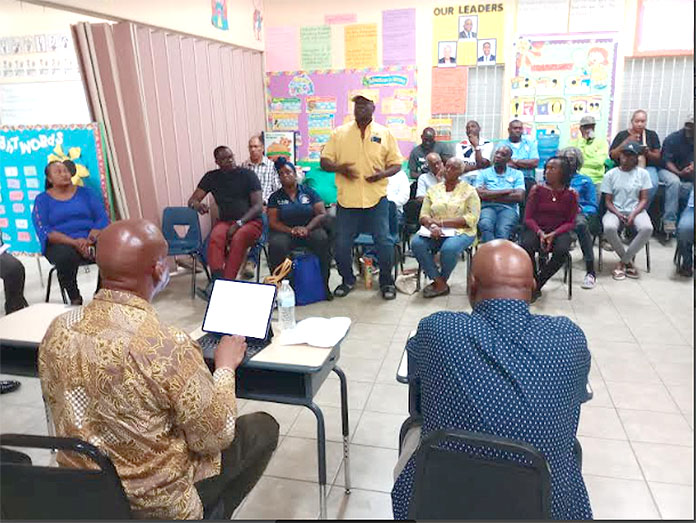
ACKLINS, The Bahamas – Resilient, robust and sustainable public infrastructure including docks, ramps, schools, clinics and roads are a priority for the Government of The Bahamas.
The Hon. Alfred Sears, Minister of Works and Utilities, underscored this point to residents of Acklins at a Town Hall meeting at Snug Corner Primary School during the first of a two-day visit to Long Cay, Crooked Island and Acklins.
Said Minister Sears, “We are designing, preparing, scoping, quantifying; we are engaging contactors to repair and rebuild, and to construct new infrastructure. In order to fulfill that public duty we have to come to you because you are living with the infrastructure in Acklins.
“The citizens of our country on the smallest island have as much right to a sound infrastructure as I do in Nassau. I don’t have any more rights than the person who is living in Salina Point, Snug Corner. Therefore, it is incumbent that we leave our offices in Nassau and go throughout the country.
“This is an opportunity to hear from you, to hear your concerns. We may have certain projects on the drawing board but when we have these sessions we get a different priority in terms of what you consider to be the most urgent needs.”
Minister Sears headed a team of officials from the Ministry of Works and Utilities (MOWU) to the southern islands April 27th and 28th. The Hon. Basil McIntosh, MP for MICAL and Minister of State for the Environment; Bacchus Rolle, Parliamentary Secretary; Sharon Pratt-Rolle, Under Secretary; Damian Francis, Deputy Director; David Cox, Senior Civil Engineer and Desmondo Boodle, Civil Inspector were among the team. Local Government practitioners, representatives of government agencies and other residents also attended the meeting.
Minister Sears told the meeting that signs of the devastation of Hurricane Joaquin to Acklins in 2015 are still visible and emphasized that the process is a continuous work.
“As we rebuild and improve we want to do it more sustainably with more resilience because more hurricanes [are] coming. As we repair, rebuild and construct new infrastructure it has to be with resilience to withstand the existential threat of more severe hurricanes in the future.”
Residents learned that among the initiatives on the drawing board for their island is the Government’s commitment to incorporate more renewable sources of energy in the generation of electricity.
“You would have seen some of the engineers visit Acklins, Cat Island, Mayaguana and Inagua doing surveys; that is a major commitment of the government. The electricity that we use we will generate from the resources that God has blessed us with and that is solar.”
Wind and ocean thermal energy conversion (OTEC) are also being viewed.
“We are looking at new sources of energy that [are] renewable within our country and we would not have to spend up to a $1M every year buying petroleum, crude oil and other carbon based products to generate electricity.”
Special attention is also being given to docks, ramps and roads throughout the island.
“In our Family Islands, throughout the country and Nassau the docks play a critical role. All of our supplies come in through the dock because of much of what we consume we import. It is also a means by which our fishing community and agriculture community get their fish products and our agriculture produce out to market.
“We have additional road works we will be doing in Acklins. In the town area generally we’re making sure that we want to open up our creeks because there are some roads that have been built over the creeks.
“In this region there is a very sensitive eco-system and a lot of mangroves. This region is feeding the entire hemisphere in terms of lobsters, various species of fish and marine life because the mangroves are so rich. These are the spawning grounds and therefore if we are blocking the creeks and destroying the mangroves not only will we not have a natural defence against hurricanes but it is also impacting the marine life of the region.
“As we build new bridges we’re trying not to put roads in the creeks but to build causeways or bridges over the creeks that allow the marine life to breathe; to provide some elevation so that bonefish guides and smaller craft can move under the bridge, are safe and robust and allow dual carriage traffic as well as for pedestrian crossings; and to ensure that the infrastructure; that is the water telecommunication and electricity cables are implanted in the concrete so that it is not exposed or vulnerable.”
Residents learned that the construction of seawalls is also a priority.
Said the Minister, “Most of the communities are on the coast. We find that if there is not a defence when you have tidal surge you will destroy the roads and have the intrusion of seawater in people’s yards and houses.” He advocated natural barriers — restoration of mangroves, boulders where appropriate, and seawalls so that the lives and homes of members of the community would be better secured.
“We will look at all of the infrastructure. We support all of the ministries too. We look at clinics, police stations, schools, administrative buildings of the government, but right now we are here to have a conversation and express any concerns, make any suggestions and recommendations to help to shape the priorities of the MOWU,” he added.
A question and answer period followed the meeting.







